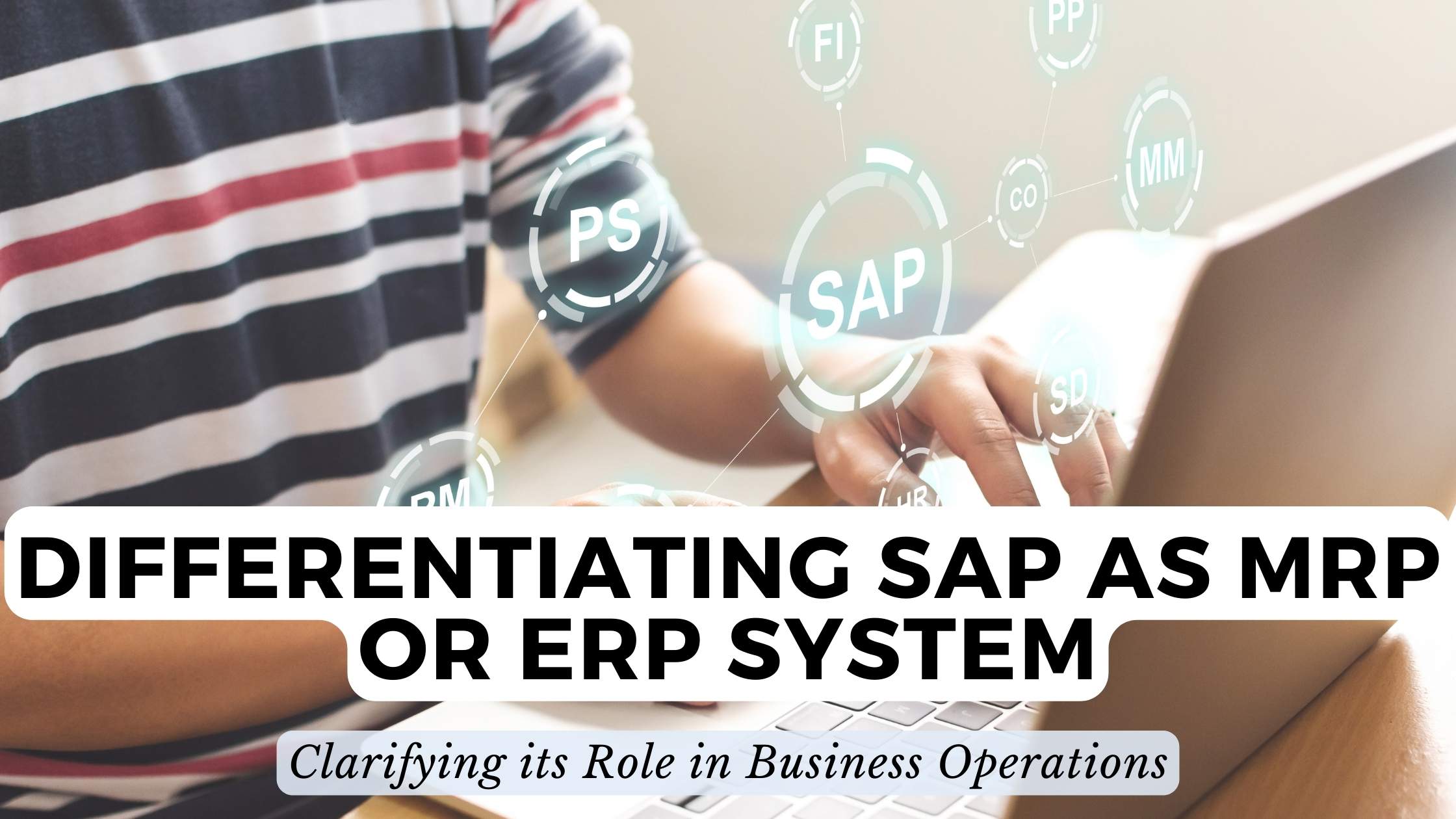Differentiating SAP as MRP or ERP System: Clarifying its Role in Business Operations
- Expense Management Software Credit Cards Investing Business Solutions


Differentiating SAP as MRP or ERP System: Clarifying its Role in Business Operations
In the realm of enterprise resource planning (ERP) and manufacturing resource planning (MRP) systems, SAP stands out as a versatile and comprehensive solution. However, there is often confusion surrounding whether SAP is primarily an MRP or ERP system. In this article, we aim to clarify the role of SAP in business operations, distinguishing between its MRP and ERP functionalities and providing insights into its capabilities.
Understanding SAP as an MRP System
MRP systems, short for Manufacturing Resource Planning, are designed to help businesses plan and manage their manufacturing processes efficiently. SAP offers MRP functionality as part of its broader ERP suite, enabling businesses to streamline production planning, scheduling, and inventory management. Key features of SAP as an MRP system include:
- Material Requirements Planning: SAP’s MRP capabilities allow businesses to forecast demand, plan procurement of raw materials, and optimize production schedules to meet customer demand efficiently.
- Inventory Management: SAP enables businesses to track inventory levels in real-time, manage stock levels, and automate replenishment processes to prevent stockouts and overstocking.
- Production Planning: With SAP MRP, businesses can create detailed production plans, allocate resources, and schedule production orders based on demand forecasts and available capacity.
SAP as an ERP System
In addition to its MRP functionalities, SAP serves as a comprehensive ERP system, integrating various business processes and functions into a unified platform. As an ERP system, SAP offers modules for finance, human resources, supply chain management, sales, and customer relationship management. Key features of SAP as an ERP system include:
- Financial Management: SAP ERP provides robust financial management capabilities, including accounting, budgeting, financial reporting, and asset management, enabling businesses to manage their finances effectively.
- Human Capital Management: SAP offers modules for human resources management, covering recruitment, payroll, performance management, and employee development, streamlining HR processes and ensuring workforce optimization.
- Supply Chain Management: SAP’s ERP suite includes modules for supply chain management, facilitating end-to-end visibility and control over supply chain processes, from procurement and logistics to production and distribution.
Clarifying SAP’s Role in Business Operations
While SAP originated as an MRP system, it has evolved into a comprehensive ERP solution that encompasses a wide range of business functions beyond manufacturing. Today, SAP serves as a central platform for managing all aspects of business operations, from finance and HR to supply chain and customer management. By leveraging SAP’s integrated suite of modules, businesses can achieve operational efficiency, agility, and scalability, driving growth and success in today’s competitive landscape.
Relevant SaaS Products for SAP Integration and Management
When it comes to integrating SAP into business operations and optimizing its performance, businesses can leverage a variety of SaaS products and tools. Here are some notable examples:
1. SAP S/4HANA Cloud:
SAP S/4HANA Cloud is SAP’s next-generation ERP suite, offering cloud-based deployment and advanced features for digital transformation. With SAP S/4HANA Cloud, businesses can streamline operations, enhance productivity, and drive innovation across the enterprise.
2. SAP Business One:
SAP Business One is a comprehensive ERP solution designed for small and midsize businesses. It offers integrated modules for finance, sales, inventory, and CRM, enabling businesses to manage their operations efficiently and effectively.
3. SAP SuccessFactors:
SAP SuccessFactors is a cloud-based HR management solution that helps businesses attract, develop, and retain top talent. With modules for recruitment, performance management, and learning, SAP SuccessFactors empowers HR teams to drive workforce excellence.
4. SAP Ariba:
SAP Ariba is a cloud-based procurement platform that connects buyers and suppliers to streamline procurement processes, improve visibility, and drive cost savings. With SAP Ariba, businesses can digitize procurement, automate supplier collaboration, and mitigate supply chain risks.
5. SAP Concur:
SAP Concur is a travel and expense management solution that helps businesses simplify expense reporting, streamline travel booking, and gain insights into spend patterns. With SAP Concur, businesses can optimize travel and expense management processes, reduce costs, and ensure compliance.
Conclusion: Leveraging SAP for Business Success
In conclusion, SAP plays a pivotal role in modern business operations, serving as both an MRP and ERP system with comprehensive functionalities across manufacturing, finance, HR, supply chain, and more. By leveraging SAP’s integrated suite of modules and solutions, businesses can streamline operations, optimize processes, and drive growth and innovation. With the right combination of SAP products and SaaS tools, businesses can unlock the full potential of SAP and achieve success in today’s dynamic business environment.
For businesses seeking to integrate SAP into their operations or optimize its performance, Subscribed.FYI offers valuable insights and resources. From SAP S/4HANA Cloud to SAP SuccessFactors and SAP Ariba, Subscribed.FYI provides comprehensive information about various SAP products and their functionalities. By comparing and evaluating different SAP solutions side by side, businesses can make informed decisions and maximize the value of their SAP investments.
Relevant Links:








